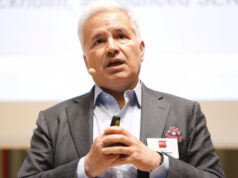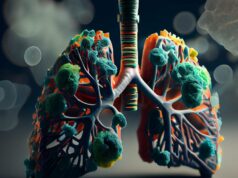
Ultimovacs på väg mot fas II-avläsning
Cancervacciners populäritet växer snabbt inom den internationella biotekniksektorn, särskilt sedan välkända namn såsom Moderna och BioNTech äntrat arenan. Det norska bioteknikbolaget Ultimovacs är redo att rida på detta momentum när bolaget nu närmar sig fas II-avläsningar med sitt universella cancervaccin UV1. BioStock pratade med vd Carlos de Sousa för att höra om de framsteg som gjorts under Q4 2022 och hur UV1 kan konkurrera med individualiserade mRNA-vacciner.
Cancerimmunterapier har ökat i popularitet tack vare deras förmåga att utnyttja och stimulera en patients immunsystem för att hjälpa det att kringgå tumörers resistensmekanismer. Checkpointhämmare är ett utmärkt exempel på detta. Deras nytta är dock fortfarande marginell för många patienter, och cancer är fortsatt en av de främsta dödsorsakerna globalt.
För att fylla detta gap har forskare vänt sig till en av de äldsta och mest framgångsrika formerna av immunterapi – vacciner. Idén att inducera ett immunsvar genom att utsätta kroppen för ett målantigen för att förhindra allvarlig sjukdom har funnits i hundratals år. Men fram till nyligen har det varit en stor utmaning att hitta cancerspecifika antigener på grund av att cancer uttrycker sig olika hos varje individ. Läs mer om cancervaccin här.
Cancervacciner blir allt populärare
Under covid-19-pandemin blev bioteknikbolag såsom BioNTech och Moderna välkända för sina mRNA covid-vacciner. Nu siktar båda bolagen på att upprepa framgången för sin teknik inom onkologiområdet.
I höstas meddelade Moderna att man nått det primära effektmåttet i en fas IIb-studie med sina individanpassade cancervacciner mRNA-4157/v940. Vaccinet utvärderas i kombination med Mercks checkpointhämmare Keytruda (pembrolizumab).
I januari i år, meddelade den brittiska regeringen att man samarbetar med BioNTech för att rekrytera så många som 10 000 patienter i prövningar av ett nytt mRNA-cancervaccin. Enligt BioNTech-grundarna kan cancervacciner bli allmänt tillgängliga 2030.
Ultimovacs eget cancervaccin
Samtidigt utvecklar det norska immun-onkologibolaget Ultimovacs sin egen cancervaccinteknik. Jämfört med Modernas eller BioNTechs vacciner, som båda är individualiserade – d.v.s. specifika för varje patient – anses Ultimovacs kandidat UV1 vara universell. Detta beror på att UV1 använder ett enzym som kallas telomeras som antigen, vilket uttrycks i cirka 90 procent av alla tumörceller.
Ultimovacs har ett brett kliniskt program som undersöker effekterna av UV1 i flera cancertyper och i kombination med checkpointhämmare såsom Keytruda. Två av de fem fas II-studierna med UV1 har slutfört patientrekryteringen. I bolagets finansiella rapport för 2022 uppger vd Carlos de Sousa att topline-data förväntas från dessa studier under första halvåret 2023. INITIUM-studien görs i metastaserat malignt melanom och NIPU-studien i metastaserat pleuramesoteliom.
»The results from these two trials represent potentially transformative milestones for Ultimovacs and cancer patients with unmet medical needs and will provide important guidance for the regulatory pathway for UV1.« — Carlos de Sousa, vd Ultimovacs
Patientrekryteringen avancerar stadigt
De andra fas II-studierna FOCUS, DOVACC och LUNGVAC rekryterar också stadigt. Sammantaget förväntar sig Ultimovacs att rekrytera mer än 650 patienter vid nästan 100 kliniska centra i 15 länder.
Under fjärde kvartalet slutförde Ultimovacs även rekryteringen till TENDU-studien i prostatacancer. Studien utvärderar Utlimovacs teknologiplattform, TET (Tetanus-Epitope Targeting). Läs mer om denna plattform här. Resultaten från denna studie förväntas under andra halvåret 2023.
Övertygande biomarkördata
I Q4-rapporten upprepar de Sousa också vikten av treåriga överlevnadsdata från den avslutade fas I-studien i metastaserat malignt melanom. Biomarköranalysen från UV1-103-studien visar att UV1 inducerar ökad effekt även hos patienter som är mindre benägna att svara på monoterapi med pembrolizumab i svårbehandlade tumörer. Dessa resultat stärker argumenten för UV1 som kombinationsbehandling ytterligare. BioStock talade med bolagets Director Medical Affairs Espen Basmo Ellingsen för att få veta mer om resultatet. Läs intervjun här.
Vd kommenterar
För att få veta mer om betydelsen av de framsteg som gjorts under Q4 kontaktade BioStock Ultimovacs vd Carlos de Sousa.
Carlos, how high is the anticipation for the first phase II data readouts?
– Interest in our Phase II data has been growing in momentum in recent months. Cancer vaccines are really one of the hot topics on the immunotherapy agenda this year, after decades of headwinds. The results may be much bigger than Ultimovacs alone: significant efficacy from UV1’s Phase II program, could be a breakthrough for universal vaccines as a therapeutic approach. Positive readouts could lead to a new class of cancer treatments to benefit patients with significant unmet medical needs.

Which readout do you find most important for Ultimovacs, and why?
– At Ultimovacs, our focus is to address major unmet needs for patients with solid tumours and as such no one trial is more important than another. INITIUM is run in-house and in our lead indication malignant melanoma. Importantly, we have conducted two previous Phase I studies in this indication with encouraging results, leading to Fast Track and Orphan Drug Designation from the FDA. If the results are positive, we are prepared – with support from the INITIUM Medical Advisory Board – to move forward with further clinical trials towards approval. The investigator-initiated trials are also very important to us because they also address diseases with high unmet medical need. These studies are initiated by specialists who believe in the potential of UV1 to deliver a meaningful clinical benefit for their patients. Again, the team at Ultimovacs is driven by bringing benefits to patients and as such, we are optimistic about all five Phase II studies.
Moderna sparked excitement with the announcement of positive phase II results with its mRNA vaccine candidate. What are your thoughts on the results?
– We are of course delighted with Moderna’s ambitions in the cancer space, as it can bring increased options for patients and Ultimovacs can also benefit from increased attention on cancer vaccines. The Moderna Keynote-942 trial, aiming to reduce the risk of recurrence in malignant melanoma patients after surgery, is in a very different patient group than those in our Phase II studies. The patient population in INITIUM has advanced or metastatic malignant melanoma, meaning surgery is not an option. We need several solutions to address different patients’ needs, and we welcome every therapy that can improve cancer treatment.
How does UV1 differentiate itself from not only Moderna’s candidate, but personalised cancer vaccines in general?
– Personalised Cancer Vaccines (PCV) and universal approaches, like UV1, have much in common: We develop an immunotherapeutic vaccine which mobilises the patient’s immune system to fight cancer with support from a checkpoint inhibitor. The main difference is that PCVs are tailor-made to each patient, or a small group of patients based on a tumour biopsy. This procedure takes some time and increases complexity and cost. A universal approach like UV1 is ready to use, meaning time to initiation of treatment can be shortened. Ease of access is also one of the key attributes of UV1. As treatment is administered intradermally, patients can be treated in community centres without the need for complex hospital infrastructures. Since UV1 targets telomerase present in 85-90 per cent of cancer types across all stages, there’s no need for biomarker screening or biopsy of the tumour. It’s often crucial to start treatment as soon as possible and not waste any time if the cancer is aggressive, and the ease of use makes UV1 potentially attractive also in earlier stages of the disease.
Does the biomarker data from the phase I study with UV1 in melanoma patients reinforce this point?
– The UV-103 trial included only 30 patients with malignant melanoma in the US, so we shouldn’t draw conclusions from it which are too exhaustive. Having said that, the biomarker data raised attention in the medical community after a plenary presentation at the International Society for Melanoma Research last year. Most compelling are the promising clinical results in so-called “hard to treat” patients, meaning those with low or no PD-L1 expression who historically have had less clinical effect from checkpoint inhibition targeting PD-1. When adding UV1 on top of pembrolizumab, the clinical effect was similar across the patient populations. Four other biomarkers further confirmed this finding, all showing the same results. The biomarker data signals that UV1 can increase the patient population that may benefit from checkpoint inhibitors, and this is encouraging news, not only for Ultimovacs.
Finally, where is partnering on your priority list at the moment?
– As we have said previously, we are in continuous dialogue with strategic partners who may be interested in a mutually beneficial collaboration. These conversations are a natural part of the development of a product at this stage as we prepare for a Phase III study, conditional on positive data from the near-term topline Phase II readouts. In this case, we expect partnering discussions to accelerate and become one of the top priorities for us.
Innehållet i BioStocks nyheter och analyser är oberoende men BioStocks verksamhet är i viss mån finansierad av bolag i branschen. Detta inlägg avser ett bolag som BioStock erhållit finansiering från.


